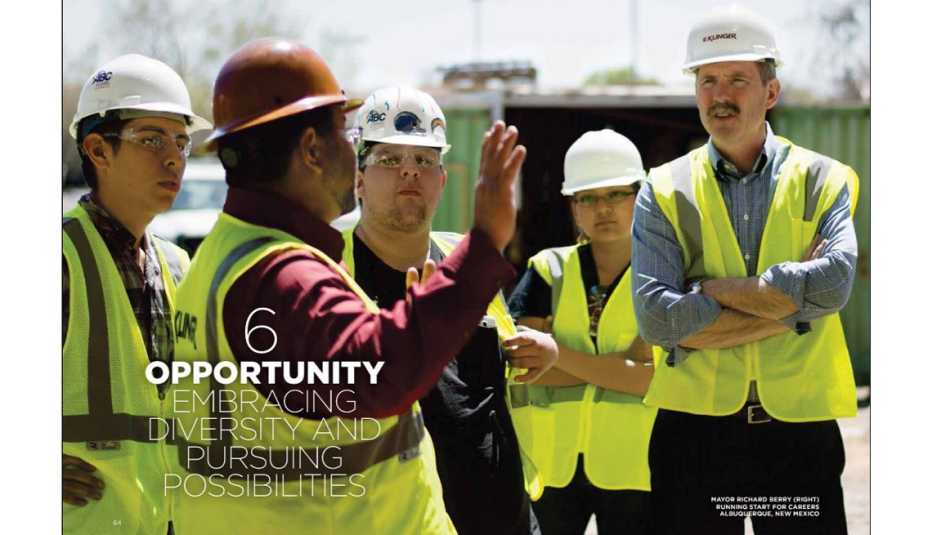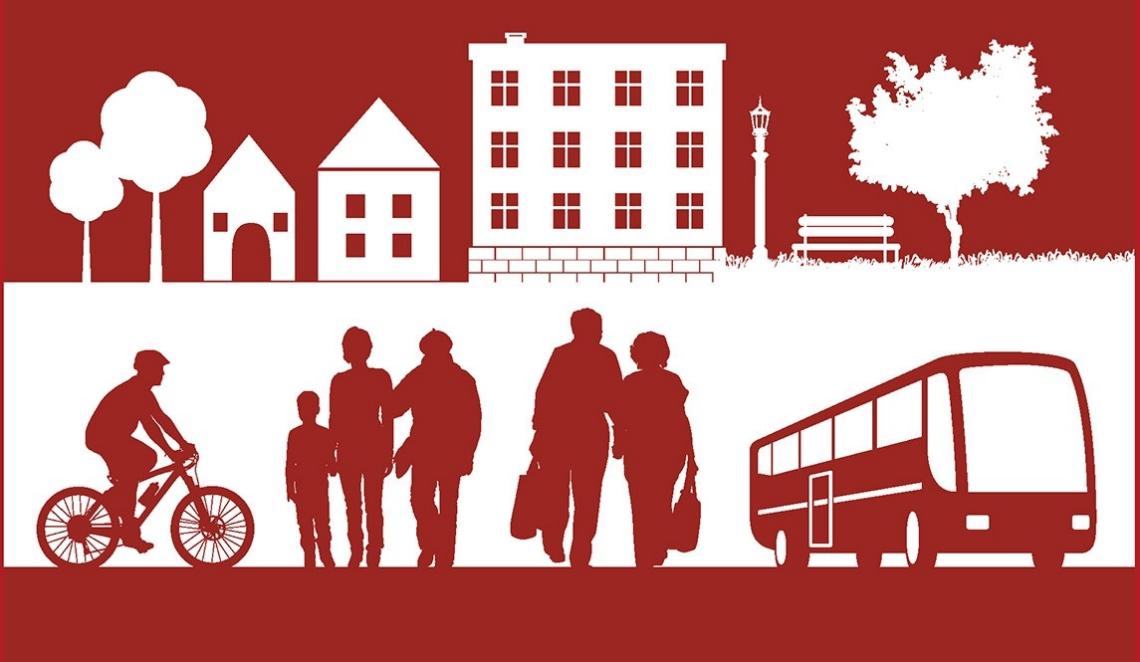AARP Hearing Center


This article is adapted from Where We Live: Communities for All Ages, a free bookazine published by AARP in 2016.
Welcoming communities give residents an equal chance to improve their well-being through employment, education, skill development and — in the 21st-century economy — access to technology.
Today’s older adults want to lead active lives that keep them connected and engaged with communities that support their goals.
Some people transition to new careers or start businesses later in life. In fact, older adults are the fastest-growing group of entrepreneurs, according to the Kaufmann Index. Others look for opportunities to explore new ideas, develop new skills or volunteer to help their neighbors and share a lifetime of experience.
Achieving financial security requires education, skill development and career opportunities that keep pace with the demands of a global, technologically driven economy. Mayors know that strong communities give Americans of all ages, from all backgrounds, ample opportunities to succeed.
Here's What Mayors Have Been Doing


Denver, Colorado
- Mayor Michael Hancock: Entrepreneurship


Small businesses, averaging 19 employees per company, make up over 40 percent of Denver’s total employment. Mayor Michael Hancock wants that number to grow.
Through the city's Jump-Start economic development programs, Hancock puts a major focus on supporting the city's entrepreneurs. A small-business lending program has helped 129 businesses start and grow, creating more than 1,200 jobs. Business assistance centers provide targeted training in accounting, finance and marketing.
With Americans aged 55 and older launching almost a quarter of new businesses nationally, according to the Kauffman Index of Entrepreneurial Activity, the entrepreneurial focus aims to benefit Denver residents of all ages: Older residents looking to start a new business get the support they need while younger workers have new job opportunities in a growing economy.
Chattanooga, Tennessee
- Mayor Andy Berke — and former Mayors Bob Corker and Ron Littlefield: Gig City
The city of Chattanooga earned the nickname "Gig City" thanks to the vision and commitment of three successive mayors who championed citywide ultra-high-speed Internet connectivity.
The groundwork for today's lightning-fast Internet speeds was laid in 2003 by then-Mayor Bob Corker (now a U.S. Senator), who partnered with the city's public electric utility to develop a high-speed broadband network serving the city's downtown business core.
Offering faster Internet speeds at a lower cost was part of Corker's digital vision for attracting new businesses and maximizing the productivity of local companies. The effort put Chattanooga on par with much larger cities when it comes to infrastructure that supports a 21st-century economy.
Then under Mayor Ron Littlefield, the city's high-speed network expanded to reach all residents in the Electric Power Board’s service area. This "fiber to the home" program made Chattanooga a destination for tech-driven entrepreneurs. It also created a new high-tech smart grid that increases the reliability and resilience of the area's power supply and promotes a host of high tech efficiencies.
Today, Mayor Andy Berke is leveraging the city's unique tech infrastructure through the Enterprise Center, a dedicated organization that supports innovation, entrepreneurship and digital inclusion. The center anchors the city's Innovation District, a 140-acre downtown hub for Chattanooga’s knowledge-based, entrepreneurial economic development initiatives.
With the city's leaders putting the critical infrastructure in place, dozens of start-up companies are building their businesses in Chattanooga, and the Innovation District has become home to nonprofits and venture funds that support further start-up development.
Albuquerque, New Mexico
- Mayor Richard Berry: Running Start for Career
Shortly after taking office, Mayor Richard Berry created the Running Start for Careers program to help students stay in school and develop practical skills with an eye toward future employment.
Through this public-private partnership between high schools and local businesses, students earn both high school and college credits toward graduation while gaining valuable experience working in high-demand industries such as construction, finance and health care. The program is working to prepare students for future careers while helping make sure they stay in school. In 2014 the high school graduation rate in the city’s public schools was 62.5 percent, but 98 percent of the Running Start for Careers participants received their high school diploma.
Buffalo, New York
- Former Mayor Byron Brown: Serious Computer Game Design Competition
Computer games are more than just entertainment in Buffalo. In March 2015, Mayor Byron Brown hosted the city’s first Serious Computer Game Design Competition to encourage technology-focused innovation. A group of local college students won the $5,000 prize with a “create your own adventure” game that helps young people see how simple choices can have an impact on their lives far into the future. Brown hopes to work with the winning team to develop a version of the game for Buffalo schools and youth programs.
Cheyenne, Wyoming
- Mayor Rick Kaysen: Wyoming's Digital Capital
Mayor Rick Kaysen and local economic development planners are working hard to turn Cheyenne into Wyoming's digital capital with new high-tech jobs that create opportunities for local residents.
Already, employers including Microsoft, satellite communications provider EchoStar, data hosting service Green House Data and the National Center for Atmospheric Research have opened large data centers that take advantage of Cheyenne’s cool climate and affordable electricity resources. Next up are start-ups attracted to the city’s fiber network infrastructure and increasingly tech-savvy workforce. By diversifying the local economy, Kaysen is working to expand opportunities for Cheyenne’s residents
Detroit, Michigan
- Mayor Mike Duggan: Grow Detroit's Young Talent
Mayor Mike Duggan's Grow Detroit's Young Talent program is a one-stop-shop to promote summer jobs for the city's youth.
Local businesses commit to offering six-week job experiences to help students acquire important real-world skills, and the city does the rest: recruiting students for each position, handling payroll and work readiness training, providing free city transportation to get to and from jobs and matching $1,000 in hourly wages. In its inaugural year, the program exceeded its goal of placing 5,000 young people in jobs; 5,594 entered the program in July 201
Grand Forks, North Dakota
- Mayor Michael Brown: Safer Tomorrows
It’s hard to thrive in a community where you don’t feel safe. Safer Tomorrows, an initiative led by Mayor Michael Brown, strives to decrease children's exposure to violence and foster a community where everyone is treated with respect and dignity.
One of just four programs in the country funded by the U.S. Department of Justice Defending Childhood Initiative, Safer Tomorrows focuses on prevention, intervention and data collection through a variety of school and community-based programs. For example, prevention-focused classes aim to help students in Grand Forks schools understand and address bullying, Internet safety, healthy relationships and dating violence. And intervention programs provide parents of infants and young children at risk of abuse with resources and support through intensive weekly home visit
Kansas City, Missouri
- Mayor Sylvester "SLY" James: Turn the Page Reading Program
Mayor Sly James is a strong believer in what he calls the "magical power"of reading. In fact, he credits his childhood love of books for his life’s success. Now he’s helping Kansas City's children discover the same magical power.
James' Turn the Page initiative mobilizes the community to help every child read proficiently by third grade. The data-driven program focuses on three key areas shown to boost a child's reading ability: school readiness, summer learning and school attendance. Through partnerships with a variety of organizations and a grassroots volunteer move-ment, Turn the Page organizes book donations, intensive summer reading programs, individualized tutoring and training tools for parents.
Since the program's inception, third-grade reading scores have improved dramatically, with 49 percent of students scoring proficient in 2015, up from 33 percent in 2011 — putting the city well on its way to the goal of 70 percent proficiency by 2017.
Los Angeles, California
- Mayor Eric Garcetti: 10,000 Strong
Eric Garcetti launched the 10,000 Strong Initiative to improve job opportunities to veterans in the Los Angeles area. A vet himself, Garcetti is leveraging partnerships with more than 100 companies and 40 nonprofit and public sector organizations to place 10,000 veterans in jobs by 2017. His office is also taking the lead coordinating job training, health care and housing services for veterans through partnerships and ongoing coordination with public and private service providers.
Miami, Florida
- Mayor Tomas Regalado: Elevate Miami
Tomás Regalado is making digital inclusion a top priority to help Miami residents leverage today’s high-tech tools. More than 30 city parks and the city's senior centers are now equipped with computer labs providing free access for users across the city. Free classes at these locations aim to help working-age and older adults learn how to use computers and access the Internet or brush up their skills. To improve access even further, Regalado's administration is working with technology companies and Internet providers on low-cost alternatives to help residents and businesses buy their own computers and devices.
Minneapolis, Minnesota
- Mayor Betsy Hodges: Working Families Agenda
With stagnant wages and other pressures putting the squeeze on Minneapolis workers, Mayor Betsy Hodges is championing a Working Families Agenda. While her initial proposal addressing fair scheduling, wage theft (denial of wages or employee benefits rightfully owed to an employee) and paid sick leave has been scaled back, Hodges isn’t giving up. Striving to build consensus, she is actively engaged in discussions with businesses and workers to develop policies that ease the economic crunch on Minneapolis families and build a strong foundation for the future.
Providence, Rhode Island
- Mayor Jorge Elorza and former Mayor Angel Taveras: Providence Talks
To make sure all children have the tools they need to succeed in school, Providence is starting early — and talking a lot. Providence Talks, an innovative citywide program, enlists adults across the community to talk to preschool children.
Research shows that hearing at least 21,000 words a day develops a young child's vocabulary to prepare them for school. Started under former Mayor Angel Taveras, the program was the Bloomberg Philanthropies Mayor’s Challenge Grand Prize Winner in 2012, securing $5 million to launch a pilot project. In 2015 Mayor Jorge Elorza expanded Providence Talks with a goal of reaching 2,500 families in two years. The program provides resources including home visits, free books and "word pedometers," which help families keep track of words used in their households.
Rochester, New York
- Mayor Lovely Warren: Anti-Poverty Initiative
Rochester has the third highest child poverty rate in the nation, and Mayor Lovely Warren is committed to doing something about it. She is making the fight against poverty a central theme of her administration, developing new solutions to supplement the city's job training programs and a state antipoverty task force.
Rochester's Office of Innovation and Strategic Initiatives is focused on data — looking at factors that drive poverty — and soliciting stakeholder input to develop new initiatives. One innovative idea under development is the creation of cooperatives — employee-owned neighborhood businesses — that give workers an opportunity to share in decision-making and business profits. Warren is spearheading the initiative with a comprehensive study, dedication of resources to help new cooperatives get up and running, and commitments from local institutions to contract with cooperatives for locally sourced goods and services. For example, local hospitals may contract with a neighborhood cooperative to provide laundry services.
Sioux Falls, South Dakota
- Mayor Mike Huether: Sioux Falls Has Jobs
Sioux Falls has successfully attracted businesses and created jobs. Now it needs to find people to fill them. Mayor Mike Huether launched the SiouxFallsHasJobs.com campaign to highlight job opportunities in the area through billboard and kiosk advertisements as well as a website for job seekers. Businesses looking to hire workers use the website to promote job openings and connect with applicants.
Tulsa, Oklahoma
- Mayor Dewey Bartlett: Mentoring to the Max
Dewey Bartlett has a new equation for success in Tulsa: Teens + Businesses = Expanded opportunities and a growing economy.
The city's Mentoring to the Max program matches area high-school students with businesses offering jobs and internships that focus on science, technology, engineering and math (STEM). The program is designed to reap benefits across the board. Young people supplement their education and expand their horizons with hands-on experiences. Businesses have eager, skilled workers. And the city develops a highly trained workforce that will help attract more businesses to grow the local economy.
Virginia Beach, Virginia
- Mayor William D. Sessoms, Jr: Financial Empowerment Initiative
Mayor William Sessoms set out to help 500 Virginia Beach families become "financially fit."
This initial effort has grown into the city's ongoing Financial Empowerment Initiative, designed to help Virginia Beach residents understand how to manage their finances, build savings and avoid debt. Participating residents take monthly classes and receive individual coaching to develop personal financial plans. Other citywide activities include savings challenges, tax assistance and a Financial Planning Day staffed by volunteer Certified Financial Planners.
The Takeaways
- 21st-century opportunities are built on 21st-century technology: In the Internet age, mayors are harnessing the power of technology to encourage innovation and the jobs of the future — from wiring cities with ultra-high speed connections and helping older residents develop computer skills to sponsoring tech-driven contests that inspire young people to dream big.
- Policies that support working families and fight poverty strengthen communities: When poverty persists and working families struggle to make ends meet, mayors are using a range of programs and policies to help fill the gaps and reverse declines.
- Partnerships with businesses boost employment and workforce development: Local governments, led by mayors, are building public-private partnerships that support entrepreneurs, put people to work and teach young people real-world job skills.
- Every child should be ready for school and have the tools to succeed: Mayors are enlisting their communities in innovative programs to make sure all children develop critical literacy skills.
Page published June 2016


























































